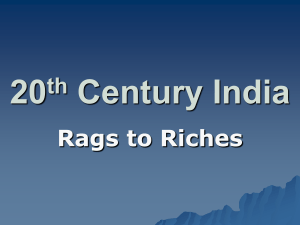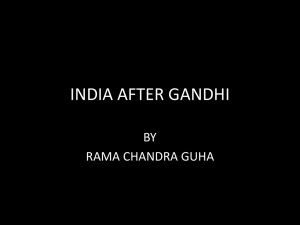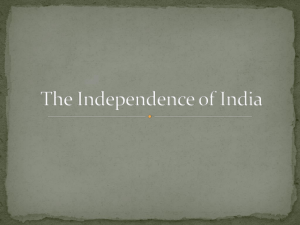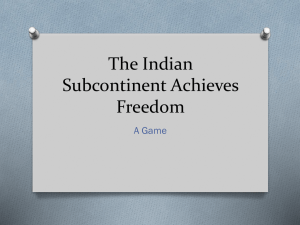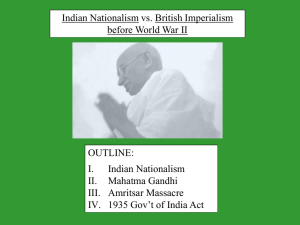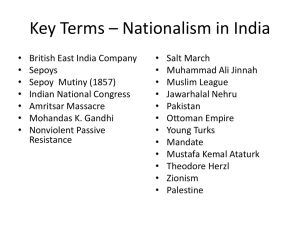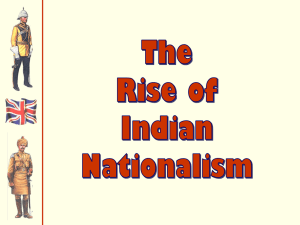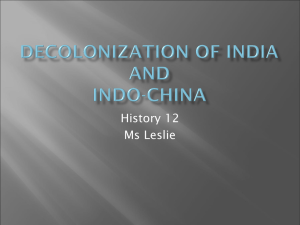Indian Independence
advertisement
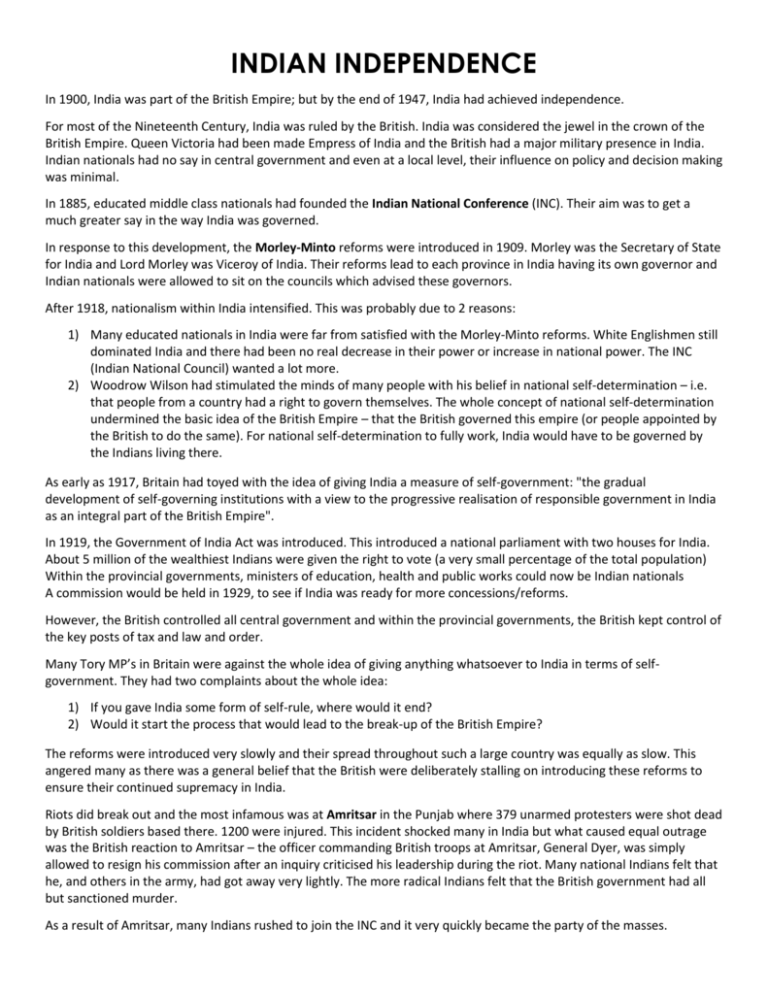
INDIAN INDEPENDENCE In 1900, India was part of the British Empire; but by the end of 1947, India had achieved independence. For most of the Nineteenth Century, India was ruled by the British. India was considered the jewel in the crown of the British Empire. Queen Victoria had been made Empress of India and the British had a major military presence in India. Indian nationals had no say in central government and even at a local level, their influence on policy and decision making was minimal. In 1885, educated middle class nationals had founded the Indian National Conference (INC). Their aim was to get a much greater say in the way India was governed. In response to this development, the Morley-Minto reforms were introduced in 1909. Morley was the Secretary of State for India and Lord Morley was Viceroy of India. Their reforms lead to each province in India having its own governor and Indian nationals were allowed to sit on the councils which advised these governors. After 1918, nationalism within India intensified. This was probably due to 2 reasons: 1) Many educated nationals in India were far from satisfied with the Morley-Minto reforms. White Englishmen still dominated India and there had been no real decrease in their power or increase in national power. The INC (Indian National Council) wanted a lot more. 2) Woodrow Wilson had stimulated the minds of many people with his belief in national self-determination – i.e. that people from a country had a right to govern themselves. The whole concept of national self-determination undermined the basic idea of the British Empire – that the British governed this empire (or people appointed by the British to do the same). For national self-determination to fully work, India would have to be governed by the Indians living there. As early as 1917, Britain had toyed with the idea of giving India a measure of self-government: "the gradual development of self-governing institutions with a view to the progressive realisation of responsible government in India as an integral part of the British Empire". In 1919, the Government of India Act was introduced. This introduced a national parliament with two houses for India. About 5 million of the wealthiest Indians were given the right to vote (a very small percentage of the total population) Within the provincial governments, ministers of education, health and public works could now be Indian nationals A commission would be held in 1929, to see if India was ready for more concessions/reforms. However, the British controlled all central government and within the provincial governments, the British kept control of the key posts of tax and law and order. Many Tory MP’s in Britain were against the whole idea of giving anything whatsoever to India in terms of selfgovernment. They had two complaints about the whole idea: 1) If you gave India some form of self-rule, where would it end? 2) Would it start the process that would lead to the break-up of the British Empire? The reforms were introduced very slowly and their spread throughout such a large country was equally as slow. This angered many as there was a general belief that the British were deliberately stalling on introducing these reforms to ensure their continued supremacy in India. Riots did break out and the most infamous was at Amritsar in the Punjab where 379 unarmed protesters were shot dead by British soldiers based there. 1200 were injured. This incident shocked many in India but what caused equal outrage was the British reaction to Amritsar – the officer commanding British troops at Amritsar, General Dyer, was simply allowed to resign his commission after an inquiry criticised his leadership during the riot. Many national Indians felt that he, and others in the army, had got away very lightly. The more radical Indians felt that the British government had all but sanctioned murder. As a result of Amritsar, many Indians rushed to join the INC and it very quickly became the party of the masses. The most vocal opponent of the idea of some form of self-rule for India was Lord Birkenhead whole was Secretary of State for India from 1924 to 1928. With such an opponent, any move to self-rule was very difficult at best, and probably impossible in reality. In India, the 1920’s saw the emergence of three men who were to have a huge impact on the future of India: Jawaharlal Nehru: Nehru was educated at Harrow and Trinity College, Cambridge. When he returned to India in 1912, he practised as a barrister. This was hardly an unexpected move as his father was the famous journalist and lawyer Motilal Nehru. Nehru became involved in Congress after the massacre at Amritsar in 1919. In 1921, Nehru was arrested and put in prison for activities associated Congress. Between 1921 and 1946, he spent 9 years in prison. When he was out of prison, he had his freedom of movement heavily restricted by the British authorities. In 1929, partly as a result of his ability and fame and also because of Gandhi's support, Nehru became president of Congress. As a result, he became a lynchpin in the negotiations that were to take place between the British and Congress over independence. He tainted his reputation by failing to give the British full support for their campaign against the Japanese in the Far East during World War Two. However, when India was given independence in 1947, Nehru was the obvious choice for Prime Minister and Foreign Minister. As India's leader, he kept the nation non-aligned. He kept this independent stance to acquire money from whatever source as he realised that India needed outside funding if she was to modernise. Nehru attempted to mediate in the Korean War and during the 1950's crisis in Vietnam. He was idolised by the Indian population and his death in May 1964, robbed the Third World of its natural leader. He was succeeded as prime Minister by Lal Shastri, who in turn was succeeded by Nehru's daughter, Mrs. Indira Gandhi in 1966. Mahatma Gandhi: Mahatma Gandhi became one of the pivotal figures, if not the main figure, in India's history in the Twentieth Century. Along with Jinnah and Nehru, Gandhi shaped India's history up to its independence in 1947. Mahatma Gandhi was born on the 2nd of October 1869 and he died on the 30th of January 1948. Gandhi was born in Porbander in western India. In 1888, he went to London to study law. He returned to Bombay to work as a barrister but went to South Africa to work in 1907. In South Africa, he took part in passive protests against the Transvaal government's treatment of Indian settlers who were in the minority in the region. In 1915, he returned to India and, after joining the Congress movement, he emerged as one of the party's leaders. Gandhi encouraged Indians to boycott British goods and buy Indian goods instead. This helped to revitalise local economies in India and it also hit home at the British by undermining their economy in the country. Gandhi preached passive resistance, believing that acts of violence against the British only provoked a negative reaction whereas passive resistance provoked the British into doing something which invariably pushed more people into supporting the Indian National Congress movement. Gandhi was imprisoned in 1922, 1930, 1933 and in 1942. While in prison, he went on hunger strike. His fame was such that his death in prison would make international headlines and greatly embarrass the British at a time when Britain was condemning dictators in Europe. In 1931, Gandhi came to Britain for the Round Table conferences. Nothing was achieved except for the publicity that Gandhi received for dressing in the clothes of an Indian villager; Gandhi saw this type of dress as perfectly normal for a man who represented the Indian people. The British representatives at the conference were more soberly dressed in formal morning dress. When in India, Gandhi took on the British where possible. He famous walk to the sea to produce salt was typical of his actions. Britain had a monopoly on salt production in India and Gandhi saw this as wrong, hence his decision to produce salt by the sea. He realised that the religious issues of India were too deep for any remedy to work. Hence he collaborated with Mountbatten and Wavell in the build up to independence in 1947. This association with the break-up of India was to cost him his life. There had been one assassination attempt on Gandhi on January 20th 1948 - it had failed. Just ten days later on the 30th January, he was assassinated by a Hindu fanatic who could not forgive Gandhi for his belief that Muslims had equal value to Hindus and no-one was better than anybody else. Muhammed Ali Jinnah: Jinnah, along with Ghandi and Nehru, played a fundamental role in India's history in the Twentieth Century. Jinnah was born in 1876 and died in 1948. Jinnah is considered to be the founding father of Pakistan. His followers called him Quaid -e-Azam which translates as Great Leader. Jinnah joined the Indian National Congress but resented the fact that it was dominated by Hindus. He also failed to support Gandhi's belief in the use of civil disobedience. In 1934, he left the INC and organised a rival to it - the Muslim League. The Muslim League had been founded in 1906 and it had originally been a cultural and religious organisation. Jinnah turned it into a more dynamic political organisation and in 1935, those Muslims who had remained in the INC joined Jinnah's Muslim League. 1937 witnessed provincial elections in India. The split between the Muslim League and Congress became apparent when Congress refused to join coalition administrations with the Muslim League in areas with mixed religion. The political scene was set that was to lead to post-1945 violence in India. In 1940 at Lahore, Jinnah called for the creation of an independent state to be called Pakistan in which Muslim could live away from Hindus. This, he argued, would bring stability to the nation and end any potential for religious violence. Jinnah supported the British in World War Two whereas Congress failed to form any form of collaboration. The end of the war witnessed elections in India. The Muslim League won nearly all the seats in Muslim areas while Congress did the same in predominantly Hindu areas. Polarisation was now obvious. Jinnah demanded a six-province Pakistan essentially those provinces that had supported the Muslim League. Congress rejected the break-up of India and Jinnah called on Muslims to engage in "direct action" - the opposite of Gandhi's passive resistance. In riots between Muslims and Hindus in Calcutta, nearly 4000 people were killed. Between 1945 and he end of 1947, many millions of Indians were killed in the violence that occurred as Muslims moved to the new Pakistan, with Hindus moving away from what was the designated land for Pakistan to Hindu dominated India. Jinnah's dream of a Muslim state became a reality in August 1947 when Pakistan was created. Jinnah became its first Governor-General. However, he was in poor health and he died of tuberculosis in 1948. Gandhi persuaded many of his followers to use non-violent protests. They had sit-down strikes, they refused to work, they refused to pay their taxes etc. If the British reacted in a heavy-handed manner, it only made the British look worse; essentially, the British would come across as bullies enforcing their rule on the bullied. However, there were those in India who wanted to use more extreme measures. Part of the 1919 Government of India Act stated that a commission would be established after 10 years to assess whether India could/should have more self-rule. This first met in 1928 – the Simon Commission. This commission reported in 1930. There were no Indians on the commission. It proposed self-government for the provinces but nothing else. This was unacceptable for the INC, which wanted dominion status, granted immediately. During the time the Simon Commission reported, Gandhi started his second civil disobedience campaign. This included Gandhi deliberately breaking the law. The law in India stated that only the government could manufacture salt. After a 250-mile march to the sea, Gandhi started to produce his own salt. This produced a violent clash with the British authorities and Gandhi was arrested. At this time, a sympathetic Viceroy to India had been appointed – Lord Irwin. He believed that India should have dominion status – and he publicly expressed this idea. Irwin pushed for the issue to be discussed. He organised two Round Table conferences in 1930 and 1931. They were both held in London. The first conference failed as no INC members were present. Most were in Indian prisons. Irwin pushed for their release and he persuaded Gandhi to travel to Britain to take part in the second conference. Despite this development, the conference achieved little as it broke down over an issue that was to haunt India in future years – religion. Those present at the second conference, argued and failed to agree over what the representation of Muslims would be in an independent Indian parliament. In 1935, the Government of India Act was introduced. Britain, at this time, had a National Government and progress was made over India purely because Stanley Baldwin, the Tory leader, and Ramsey-MacDonald, the Labour leader, agreed on a joint course of action. Winston Churchill was bitterly opposed to it. The Act introduced: An elected Indian assembly to have a say in everything in India except defence and foreign affairs. The eleven provincial assemblies were to have effective full control over local affairs. The nationalists in India were not satisfied with this as the act did not introduce dominion status and white dominions were allowed to control their own defence and foreign policies. Also the princes who still ruled areas of India still refused to co-operate with the provincial assemblies so the second strand of the Act would have been meaningless. The act’s major failing was that it ignored the religious rivalry between the Muslims and Hindus. Nearly two-thirds of India’s population were Hindus and the Muslims feared that in an independent and democratic India they would be treated unfairly. In the 1937 provincial elections, the Hindus, who dominated the Congress Party under Nehru, won eight out of the eleven provinces. The Muslim League under Jinnah demanded a separate state of their own to be called Pakistan. Both Gandhi and the Congress Party were determined to preserve Indian unity. Such a rivalry between the Hindus and Muslims could only bode ill for the future of India. World War Two shelved the Indian issue – albeit temporarily. The Indians provided valuable military help in the fight against Japan especially in the campaign in Burma. The British promised dominion status for India once the war had ended. In 1945, the newly elected Labour government headed by Clement Attlee wanted to push ahead with solving what was seen as the "Indian Problem". However, the religious rivalry in India was coming to a head and made any potential solution very complex. Attempts to draw up a compromise constitution that was acceptable to both Muslims and Hindus failed. The British plan was to allow the provincial governments extensive powers whilst central government would only have limited powers. The Labour government put its faith in the hope that most Muslims lived in one or two provinces and that the governments in these provinces would reflect this in their decision making. If this plan worked, the need for a separate Muslim state would not be needed. The plan was accepted in principle but the details for it were not. The Governor-General of India, Lord Wavell, invited Nehru to form an interim government in August 1946. Wavell hoped that the details of such a government could be sorted out later – but he hoped that the creation of an actual government headed by Indian nationals would be supported by all. The Hindu Nehru included two Muslims in his cabinet but this did not succeed in stopping violence. Jinnah became convinced that Nehru could not be trusted and he called on Muslims to take "direct action" to get an independent Muslim state. Violence spread and over 5000 people were killed in Calcutta. India descended into civil war. Early in 1947, Atlee announced that Britain would leave India no later than June 1948. A new Viceroy was appointed – Lord Mountbatten – and he concluded that peace could only be achieved if partition was introduced. The Hindu Congress agreed with him. Mountbatten became convinced that any delay would increase violence and he pushed forward the date for Britain leaving India to August 1947. In August 1947, the Indian Independence Act was signed. This separated the Muslim majority areas (in the north-west and north-east regions of India) from India to create the independent state of Pakistan. This new state was split in two, the two parts being 1000 miles apart. The act was not easy to put into action. Some people found themselves on the wrong side of frontiers especially in the mixed provinces of the Punjab and Bengal. Millions moved to the new frontiers – Hindus in what was to be the new Pakistan moved to India while Muslims in India moved to Pakistan. Where the two moving groups met, violence occurred especially in the volatile Punjab province where it is though 250,000 people were murdered in religious clashes. By the end of 1947, it seemed as if the violence was on the wane but in January 1948, a Hindu assassinated Gandhi. In a gesture that summed up the whole problem of India, the Hindu detested Gandhi’s tolerance towards Muslims. However, the murder of Gandhi shocked so many people, that ironically it ushered in a period of stability. Indian Independence Questions 1. Why did India desire independence in the postwar period? 2. How did India gain independence? Why was Britain willing to let go of its ‘jewel in the crown?’ 3. How did each of the following impact the Indian independence movement? Gandhi Jinnah Nehru 4. Why did conflict erupt upon India’s independence? 5. Why was the former British colony split into India and Pakistan? Primary Source Extension The Quit India Resolution endorsed by All-India Congress, August 1942. The All-India Congress Committee has given the most careful consideration to the reference made to it by the Working Committee in their resolution dated July 14, 1942, and to subsequent events, including the development of the war situation, the utterances of responsible spokesmen of the British Government, and the comments and criticisms made in India and abroad. The Committee approves of and endorses that resolution, and is of opinion that events subsequent to it have given it further justification, and have made it clear that the immediate ending of British rule in India is an urgent necessity, both for the sake of India and for the success of the cause of the United Nations. The continuation of that rule is degrading and enfeebling India and making her progressively less capable of defending herself and of contributing to the cause of world freedom. The Committee has viewed with dismay the deterioration of the situation on the Russian and Chinese peoples its high appreciation of their heroism in defence of their freedom. This increasing peril makes it incumbent on all those who strive for freedom and who sympathise with the victims of aggression, to examine the foundations of the policy so far pursued by the Allied Nations, which have led to repeated and disastrous failure. It is not by adhering to such aims and policies and methods that failure can be converted into success, for past experience has shown that failure is inherent in them. These policies have been based not on freedom so much as on the domination of subject and Colonial countries, and the continuation of the Imperialist tradition and method. The possession of Empire, instead of adding to the strength of the ruling power, has become a burden and a curse. India, the classic land of modern Imperialism, has become the crux of the question, for by the freedom of India will Britain and the United Nations be judged, and the peoples of Asia and Africa be filled with hope and enthusiasm. The ending of British rule in this country is thus a vital and immediate issue on which depend the future of the war and the success of freedom and democracy. A free India will assure this success by throwing all her great resources in the struggle for freedom and against the aggression of Nazism, Fascism and Imperialism. This will not only affect materially the fortunes of the war, but will bring all subject and oppressed humanity on the side of the United Nations and give these nations, whose ally India would be the moral and spiritual leadership of the world. India in bondage will continue to be the symbol of British Imperialism and the taint of that imperialism will affect the fortunes of all the United Nations. Document Analysis Title: Date: Authors: Location: Purpose: Summary: Significance:
